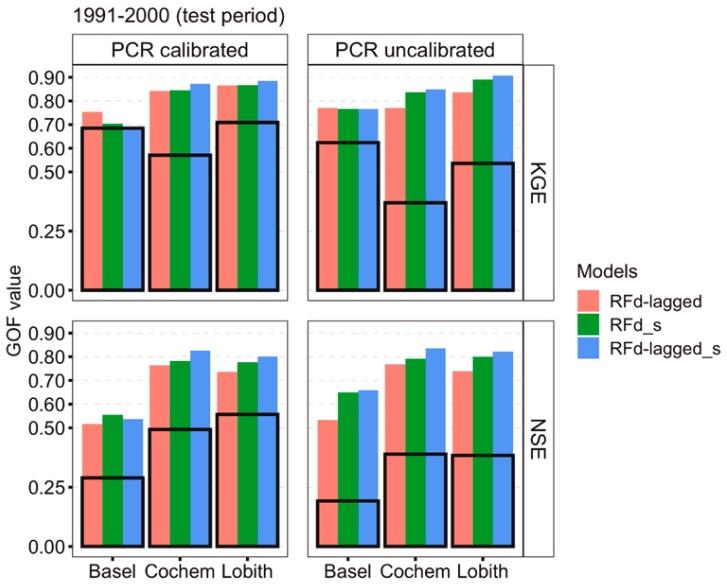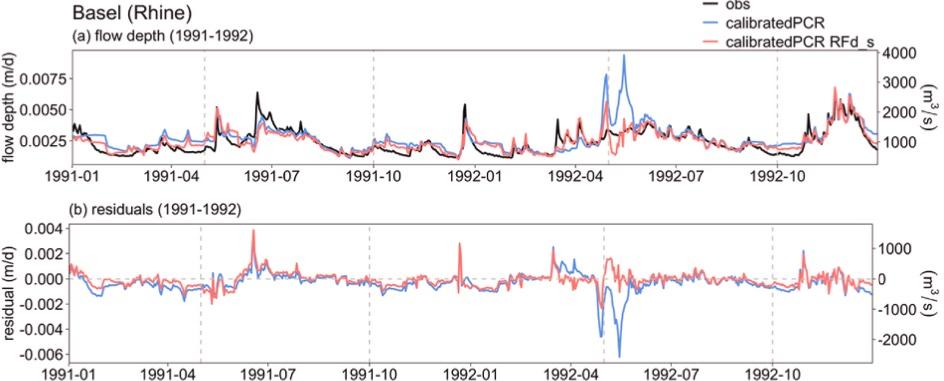PCRaster available for Python 3.13
PCRaster 4.4.1 is now available for Python 3.13! Packages for Python 3.8 are no longer updated, users should migrate to a more recent Python version. All packages are available on conda-forge! Happy modelling!
PCRaster 4.4.1 is now available for Python 3.13! Packages for Python 3.8 are no longer updated, users should migrate to a more recent Python version. All packages are available on conda-forge! Happy modelling!
Reducing errors in predictions from forward simulation models is often achieved by model calibration or data assimilation. In our recently published manuscript, Youchen Shen and our team explore an alternative that involves correction of predictions using a machine learning algorithm (Random Forests). We use streamflow predictions from the global water balance model PCRGLOB-WB as case study. It is hypothesized that the forcings (e.g. precipitation) as well as the simulated state variables (e.g. streamflow) of the simulation are informative for the magnitude of the error in streamflow predicted by the model. In particular the use of the simulated state variables is an innovative aspect of our study.
The figure below compares the different scenarios (Basel (Rhine); NSE and KGE, larger values indicate smaller errors). Black-outlined boxes give the performance of the simulation model without error correction, for the calibrated and the uncalibrated simulation model. The coloured bars give the performance after error correction. Using only meteorogical driving variables in error correction (red bars) considerably reduces error. The use of simulated state variables (green, blue) further reduces errors.

The figure below shows the effect on the predicted hydrographs (black, observed streamflow; blue calibrated simulation model; red after error correction).

Our approach is promising as it shows that error correction using a random forest provides errors in streamflow predictions that are considerably smaller than those from a calibrated model. We also show that simulated model state is informative of the magnitude of the error. Read the full paper at https://doi.org/10.1016/j.cageo.2021.105019
Like almost every year, we present our work at the EGU General Assembly, 19-30 April 2021. It is an online event. Our presentations are:
Karssenberg1, D., Schmitz1, O., Verstegen2, J.A., de Jong1, K.
1Utrecht University, the Netherlands, 2University of Münster, Germany
Correspondence: d.karssenberg@uu.nl
We are organising this online workshop at the iEMSs Conference 2020, https://iemss2020.com
Platform: ZOOM
The heterogeneous nature of environmental systems poses a challenge on researchers constructing environmental models. Many simulation models need to incorporate phenomena that are represented as spatially and temporally continuous fields as well as phenomena that are modelled as spatially and temporally bounded agents. Examples include mobile animals (agents) interacting with vegetation (fields) or water reservoirs (agents) as components of hydrological catchments (fields). We share ideas on the design and implementation of a new data model1,2 and modelling system for development of such field-agent based models. In addition, we present a short hands-on workshop with the software.
References
de Bakker, M. P., de Jong, K., Schmitz, O. & Karssenberg, D. Design and demonstration of a data model to integrate agent-based and field-based modelling. Environ. Model. Softw. 89, 172–189 (2017).
de Jong, K. & Karssenberg, D. A physical data model for spatio-temporal objects. Environ. Model. Softw. 122, 104553 (2019).
Tentative schedule
Important note: during the workshop we will demo the prototype software. If you wish, you can also run the examples that we will show yourself, during or after the workshop. For installation instructions and an explanation how to run the scripts, refer to https://campo.computationalgeography.org/workshops/iemss2020/
Workshop duration: 2 hours
Introduction to workshop (5 minutes)
Presentation and discussion on concepts and software for field-agent based modelling (workshop organizers) (30 minutes)
Demo / Hands-on workshop (workshop participants)
Discussion (all)
Wrap-up and next steps
We used to be at http://www.pcraster.eu. As our research covers much more than PCRaster alone, we will publish from now on information and news on our research on this new website. The PCRaster site will stay online, but it will be more focussed on the PCRaster software.